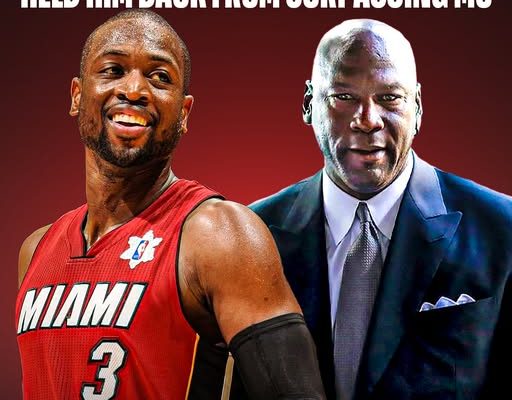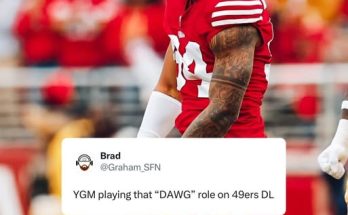Dwyane Wade, a name etched deeply into the annals of NBA history, was never short on confidence. From his electrifying rookie season with the Miami Heat to his final curtain call, Wade played the game with heart, swagger, and an unmistakable belief in his own greatness. As one of the most dominant shooting guards in league history, Wade at his peak drew comparisons to the very best who had ever played the position. One of those names, of course, was Michael Jordan — the player who set the gold standard not just for shooting guards, but for greatness in general. What may surprise many is that Dwyane Wade once sincerely believed he had what it took to catch Michael Jordan, perhaps even eclipse him. And he might have, had it not been for one thing — injuries.
Wade’s confidence wasn’t blind. It was rooted in achievement and observable excellence. From the moment he entered the league in 2003, Wade made it clear he was different. He wasn’t just another athletic guard; he was a predator on the court, capable of slashing through defenses with deceptive agility, clutch under pressure, and blessed with elite two-way capabilities. By his third season, Wade had already led the Miami Heat to their first NBA championship, claiming Finals MVP in 2006 with a performance that many still regard as one of the most dominant in NBA Finals history. Averaging 34.7 points, 7.8 rebounds, 3.8 assists, and 2.7 steals against the Dallas Mavericks, Wade’s explosion was Jordanesque. It wasn’t hyperbole anymore. Fans and analysts began to entertain the notion that he could be the heir to Jordan’s throne — at least in terms of legacy at the shooting guard position.
That confidence only grew stronger in Wade himself. He didn’t just want to be great; he wanted to be the greatest. In interviews years later, Wade admitted that during his early years in the NBA, he used to look at Jordan’s career milestones — the six championships, the ten scoring titles, the five MVPs — and tell himself that he could get there. He believed he could replicate, maybe even surpass, what Jordan had done. Wade wasn’t merely chasing greatness; he was chasing the ghost that Jordan left behind.
But there was an unavoidable reality that Wade soon came to confront. Injuries began to creep into his career like an unwelcome guest that simply refused to leave. His aggressive, slashing style — the very thing that made him so unstoppable — also made his body more vulnerable. Wade would hit the floor hard after those soaring drives to the rim. And each fall, each awkward landing, took a toll. The knees that once propelled him above the rim began to bark. The shoulders that absorbed contact started to wear. Bit by bit, Wade’s durability became his Achilles heel.
By the end of the 2006–07 season, Wade was already undergoing surgeries and missing significant chunks of time. His once ascending career trajectory began to level off not because he lacked skill or heart, but because his body was betraying him. It’s telling that in the middle portion of his career, Wade rarely played full seasons. From 2006 to 2013, he missed over 120 games due to a variety of ailments, most notably issues with his knees. That’s the part of the story many forget — how much Wade was playing through pain, adapting his game on the fly, and sacrificing parts of himself just to stay on the floor.
Despite all that, Wade remained elite for many years. He won two more championships alongside LeBron James and Chris Bosh in 2012 and 2013, and remained a consistent All-Star into the twilight of his career. But the dream of catching Jordan had quietly slipped away. Wade acknowledged as much, later saying that he realized by his early 30s that Jordan’s records, especially the six championships and scoring titles, were out of reach. “I used to think I could catch Mike,” Wade once said in a candid moment. “But then the injuries kept happening. I couldn’t stay on the floor enough to chase him.”
It was a sobering realization, but not one that diminished Wade’s place in history. He remains one of the top five shooting guards to ever play the game — often ranked third behind only Jordan and Kobe Bryant. His impact on the Miami Heat franchise is immeasurable. He turned a young expansion team into a championship organization, and his loyalty and leadership became the stuff of legend. Wade’s number 3 jersey now hangs in the rafters, not just in Miami, but in basketball lore.
Yet, the what-if lingers. What if Wade had been blessed with the durability of a Jordan or a LeBron James? What if he had played 80 games a season instead of battling through swelling knees and surgeries? What if his prime had lasted five more years? In those hypothetical realities, it’s not far-fetched to imagine Wade challenging for even more titles, perhaps adding MVP trophies to his resume, or chasing down Jordan’s 32,292 career points — a number Wade ended up far shy of, in large part because of the games he missed.
Still, Wade’s story is not one of disappointment, but of incredible triumph in the face of adversity. Few players have ever squeezed as much success out of a career that was, at times, constantly under siege by injury. He adapted. He evolved. In the later stages of his career, he became more of a post-up guard, more reliant on footwork and finesse than raw athleticism. He became a mentor, a leader, and an ambassador for the game. Even when he wasn’t catching Jordan on the stat sheet, he was emulating him in another crucial way — as a symbol of excellence and class.
Off the court, Wade’s legacy only grew stronger. He became a model of fatherhood, advocacy, and authenticity. Like Jordan, he transcended the hardwood and became a brand unto himself. But unlike Jordan, Wade was not obsessed with the myth of perfection. He was more human, more transparent, more willing to show vulnerability. That’s what endeared him to fans in ways even Jordan could not replicate. While MJ kept the world at arm’s length, Wade invited it in — through his words, his tears, his unfiltered journey.
Wade’s confidence in his early years wasn’t misplaced. It was the confidence of someone who knew what they were capable of — and who came heartbreakingly close to reaching those heights. There’s no shame in falling short of Jordan. In fact, to be in the same conversation is an honor few will ever earn. Wade didn’t need to surpass Jordan to be a legend. He carved his own path, one defined by perseverance, reinvention, and unforgettable moments.
Perhaps the most fitting tribute to Wade’s greatness is that, when fans talk about the greatest shooting guards of all time, his name always comes up. And not as an afterthought. It comes up in the same breath as Jordan and Kobe, because despite the setbacks, despite the injuries, Wade never stopped being Dwyane Wade — fearless, flashy, and full of fire. He didn’t catch Jordan, but he didn’t need to. He became something just as rare: a legend in his own right, with a legacy that will inspire for generations to come.



